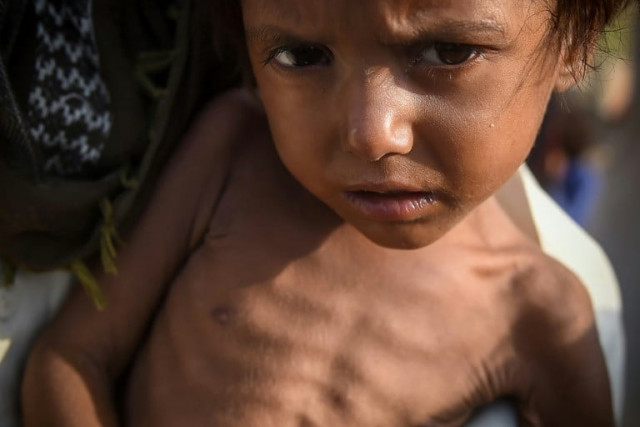1 in 9 children in Pakistan's flood-hit areas suffering from severe malnutrition: UNICEF
Cases of malnutrition escalate rapidly as the lives of millions of children remain in jeopardy

One in nine children under 5 years of age admitted to health facilities in Pakistan's flood-battered areas are found to be suffering from "severe acute" malnutrition, according to a UN report.
The report released by UNICEF on Friday warned that the health facilities are reporting alarming levels of severe acute malnutrition among children in southern Sindh and southwestern Balochistan provinces, the two worst-hit regions in last month's devastating floods.
In total, of the over 22,000 children screened by health professionals since September at health facilities in flood-hit regions, more than 2,630 were diagnosed with severe acute malnutrition.
Severe acute malnutrition, also known as severe wasting, is a life-threatening condition where children are too thin for their height, resulting in weakened immune systems.
Estimates based on the pre-existing malnutrition prevalence of the latest National Nutrition Survey indicate that close to 1.6 million children could be suffering from severe acute malnutrition and are in need of urgent treatment in flood-torn areas of Sindh and Balochistan, the report said.
Read A month later, Pakistan’s flood victims continue to flounder
Malnourished pregnant women, it added, are also at risk of giving birth to low birth-weight babies who will be malnourished.
Devastating rains and floods last month submerged a third of Pakistan, killing nearly 1,700 people and inflicting a colossal loss of $30 billion in terms of infrastructure and agriculture.
Around 33 million people of the country's nearly 230 million population were affected by the historic floods, with tens of thousands still taking refuge in shelter camps.
“We cannot sound this alarm loudly enough,” said Abdullah Fadil, UNICEF representative in Pakistan, in a statement.
“We are facing a nutrition emergency that is threatening the lives of millions of children. Without urgent action, we are heading towards a catastrophic outcome that is threatening children’s very development and survival," he added.
Even before the devastating floods, half of the children living in the now flood-affected districts were already stunted -- an irreversible condition that stunts the growth, physical and cognitive development of children.
Likewise, the report further said, more than 40% of mothers suffered from anemia.
Only 13% of UNICEF appeal funded so far
Over 25 million children and women across Pakistan, including more than 7 million children and women in flood-affected areas, require immediate access to essential nutrition services.
A lack of safe drinking water and hygiene increases the risk of wasting, as unsafe water can cause diarrhea and prevent children from getting the nutrients they need to survive, the UN body said.
Over 5 million people, it maintained, no longer have safe drinking water sources and more than 6 million no longer have home sanitation facilities. As a result, the percentage of people practicing open defecation has increased from one-fifth before the floods, to over one-third of the affected population.
At the same time, water-borne illnesses are quickly spreading among children and families and cases of acute watery diarrhea, malaria, dengue fever, skin conditions, respiratory infections and other diseases are also sharply rising.
Read More WHO sets up 19 nutrition stabilisation centres in flood-hit areas
In response, the report went on to say, UNICEF is delivering 2 million liters of safe drinking water every day, rehabilitating water systems, distributing hygiene kits and providing sanitation and hygiene services.
UNICEF has revised its appeal to $173.5 million, of which $35 million will go towards lifesaving nutrition services and $58 million towards essential water, sanitation and hygiene services.
However, only 13% of UNICEF's appeal for the children and families of Pakistan has so far been funded, it added.
The UNICEF reiterated its call for support from the international community in order to reach over 7 million children, adolescent girls and women who are in need of nutrition services, over 5 million people who are in need of safe drinking water, and over 6 million "who are in need of sanitation services."
It also called for integration of nutrition into government health delivery services and increased allocation of government funding for nutrition in the long term.



















COMMENTS
Comments are moderated and generally will be posted if they are on-topic and not abusive.
For more information, please see our Comments FAQ